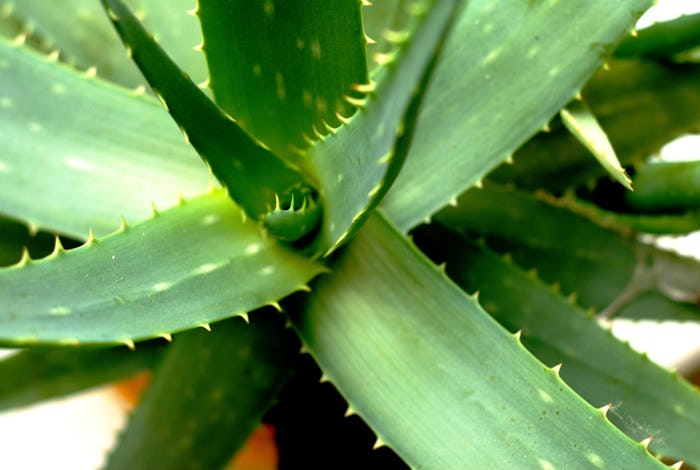Life
Here's What Experts Think About Using Aloe Vera When TTC
My grandmother had an aloe vera plant in her house at the beach. Whenever a sunburn appeared, she would snip off the tip of a leaf and rub the gooey stuff on our red skin. It's hard to say which was ultimately more soothing — the aloe vera gel or a grandmother's touch — but nevertheless, I've always considered the aloe vera plant to be a magical species, and I'm not the only one. But can aloe vera help you get pregnant? Aloe vera plants are used topically and orally to treat a variety of conditions from skin problems to diabetes and constipation, so it makes sense to wonder. But what do experts say? Are the pregnancy forums true?
Romper spoke with Dr. Alan B. Copperman, Director of the Division of Reproductive Endocrinology and Infertility, as well as the Vice-Chairman of the Department of Obstetrics, Gynecology, and Reproductive Science at Mount Sinai Medical Center in New York to find out. He explains that "aloe vera's use can be traced back 6,000 years to early Egypt." So people have believed this plant to be a balm of one kind or another since ancient times. However, "while aloe can be found in many consumer products, including lotions and sunburn treatment, scientific proof of its effectiveness has been questioned," Copperman says.
He understands why aloe vera might be linked to fertility. "Interestingly, the leaves from the aloe vera plant contain phytoestrogens, compounds that can mimic the effects of estrogen." But in the end, "the amount of aloe that reaches the ovaries or uterus is unlikely to impact reproductive function." According to Copperman, "the bottom line is that there is no real evidence that aloe either assists or hinders fertility in humans."
This is also true if you're using or considering using aloe vera as a lubricant. 100 percent aloe is already known as a gentle, natural lube, according to a Bustle article, and aloe also commonly appears as one of many ingredients in personal lubricants you buy at the store. However, Copperman explains, "Some lubricants can have an aloe vera base, but that doesn’t necessarily make them 'sperm-friendly.'"
So are there specific lubricants that would make a difference in your chances of conceiving? Romper asks Copperman, who recommends looking for lube options that won't be toxic to sperm. Natural lubes in this category include "egg whites and baby oil," says Copperman, and he mentions Pre-Seed as a commercial option. Of course, when you choose a personal lubricant, you want to take your own skin sensitivity into account. It's also important to note that the best lubricant for your trying to conceive (TTC) days won't necessarily be your first choice when it's back to business as usual. For example, "latex condoms rapidly lose strength if exposed to oil-based lubricants," reported the World Health Organization.
Commercial fertility lubricants such as Pre-Seed claim to work by mimicking your fertile cervical mucus, thus enhancing a supportive environment for sperm and helping them reach the egg. While there's no concrete evidence that these lubes will actually increase your chances of baby-making, according to The Bump, they won't hurt your chances either. So if you need a personal lubricant anyway for comfort, you can give yourself peace of mind by choosing one optimized for fertility.
The journey from trying to conceive to a positive pregnancy test can be long and arduous. It's natural to want to do everything possible to improve your chances, and the Internet is always buzzing with a new tip. However, you can avoid disappointment by being realistic about fertility-boosting tricks that are backed by scientific evidence. If you are trying to get pregnant, ask your doctor for tips on optimizing your fertility. If you've been trying for a while without success, talk to your doctor about the best options for you to try next. Your OB can also help you decide if it's time to see a fertility specialist, with or without the use of aloe vera.
Check out Romper's new video series, Romper's Doula Diaries:
Check out the entire Romper's Doula Diaries series and other videos on Facebook and the Bustle app across Apple TV, Roku, and Amazon Fire TV.
This article was originally published on
